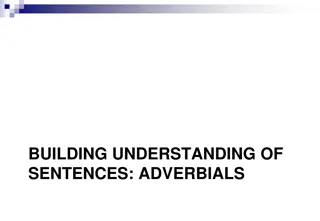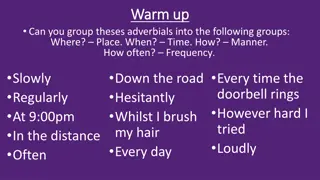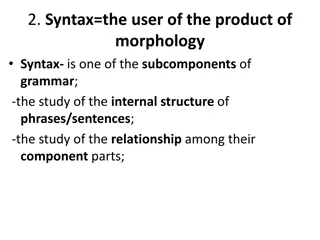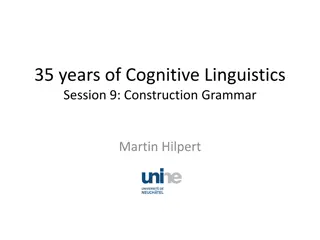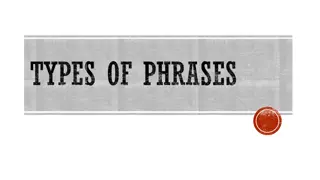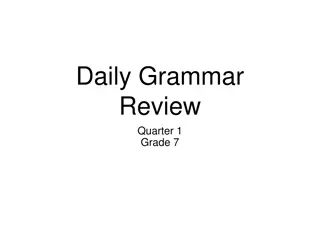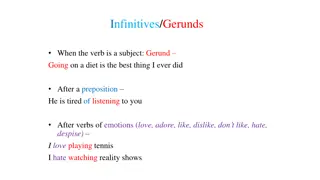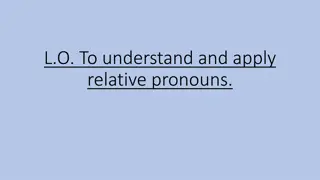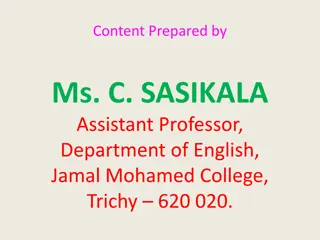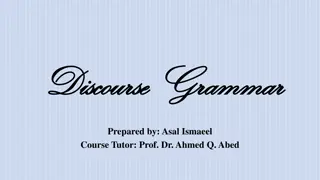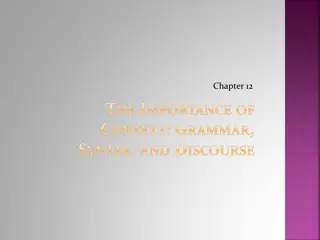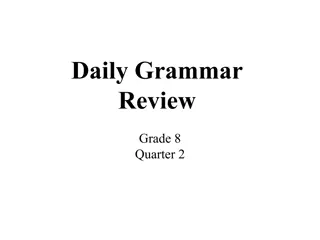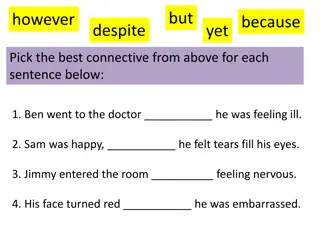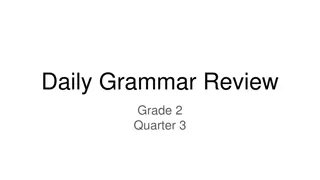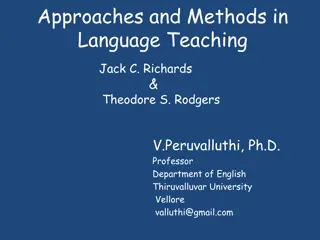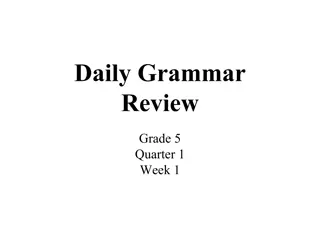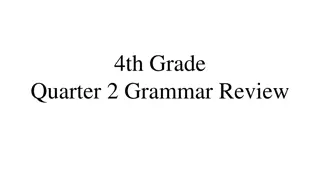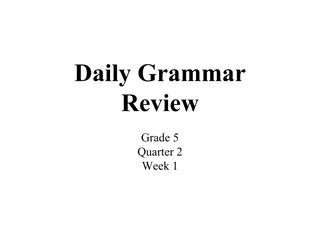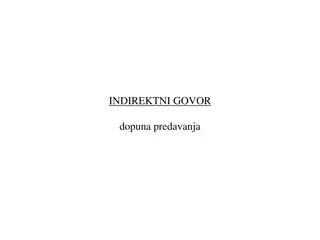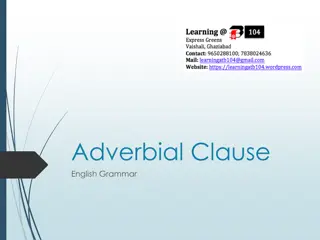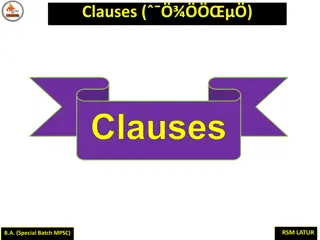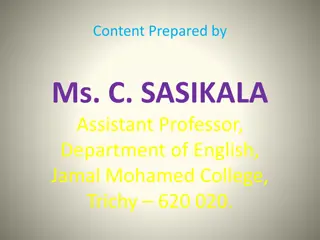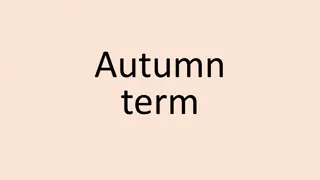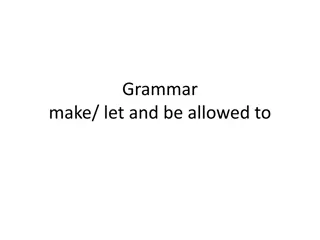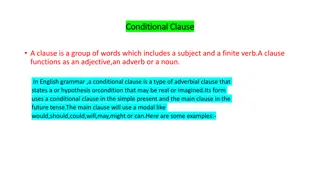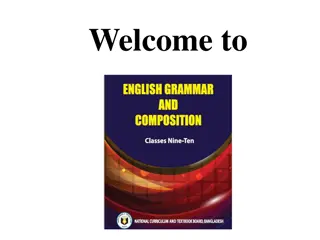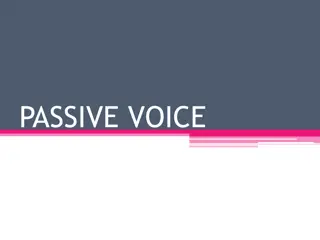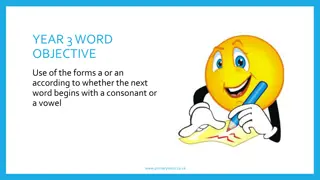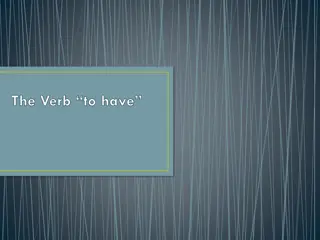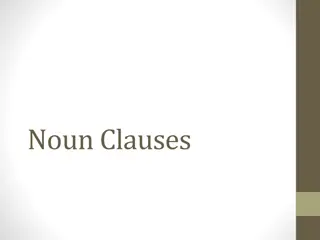Understanding Adverbials in English Grammar
Explore the concept of adverbials in English grammar, including movable adverbials, different types of adverbs, sentence modifiers, prepositional phrases, and the importance of avoiding ambiguity. Learn how adverbials can modify verbs and nouns, and how their positioning can impact meaning and clarity in writing.
Download Presentation

Please find below an Image/Link to download the presentation.
The content on the website is provided AS IS for your information and personal use only. It may not be sold, licensed, or shared on other websites without obtaining consent from the author. Download presentation by click this link. If you encounter any issues during the download, it is possible that the publisher has removed the file from their server.
E N D
Presentation Transcript
CHOOSING ADVERBIALS
Movable Adverbials The audience gasped nervously throughout the theater when the magician thrust his sword into the box. All underlined structures are adverbs: The audience gasped (How?) nervously. -- ADVERB The audience gasped (Where?) throughout the theater. PREPOSITIONAL PHRASE The audience gasped (When?) when the magician thrust his sword into the box. -- CLAUSE But, there is no fixed slot for most adverbials; they can move. E.g. When the magician thrust his sword into the box, the audience nervously gasped throughout the theater. Throughout the theater the audience gasped nervously when the magician thrust his sword into the box.
Adverbs The most movable ones (at the beginning, end, between the subject and predicate, within the main verb) E.g. My roommate is seriously thinking about changing her major. (modifies the verb) My roommate is thinking seriously about changing her major. (modifies the verb but with more stress on the adverb)
When used at the beginning of a sentence and set off by a comma, it modifies the whole sentence (sentence modifier) E.g. Seriously, my roommate is thinking about changing her major. (modifies the whole sentence) Clearly, something has to be done about the health system. Luckily, we survived the accident with only minor injuries.
Prepositional Phrases There are many prepositional phrases (even more than adverbs) Direction: toward the pond, beyond the ridge, Place: near the marina, on the expressway, Time: on Tuesday afternoon, at noon, Duration: until 3 o clock, for several days, Manner: in an appalling series of eruptions, by myself, Cause: because of the storm, for a good reason,
Some have modifiers He arrived shortly before noon. The house was built directly over the water. They are movable But, those referring to time more movable than those referring to place, especially when both appear in the same sentence: E.g. For several hours on Saturday, we hiked in the woods. On Saturday, we hiked in the woods for several hours. We are less likely to say: In the woods, we hiked on Saturday for several hours.
Prepositional phrases can modify both verbs and nouns, So, possible problem of ambiguity. E.g. They discussed their problems with the teacher. could be interpreted in two ways: meaning with whom (if the PP is adverbial) or which problems (if the PP is adjectival) Avoiding ambiguity is very important in writing
Noun Phrases Nouns and noun phrases that function as adverbs are small in number. Generally they are prepositional phrases with their prepositions missing: E.g. I studied (for) five hours yesterday My vacation begins (on) Friday
Sometimes they come after an intransitive verb and look like a direct object (but they are adverbials) E.g. The hikers walked single file up the steep trail. I study every night until 1.00 am. The children ran home as fast as their legs would carry them. Be careful! They are not direct objects so you cannot transform them into passive voice. E.g. Every night is studied until 1.00 am (wrong!)
Verb Phrases Verb phrases = infinitive phrases I got up early this morning to study for my test. The subject in both verbs are I (I got up; I studied) Avoid using dangling sentences! E.g. To keep your grades up, a regular study schedule is important. Subject you does not work for both! Corrected version To keep your grades up, you ought to follow a regular study schedule.
Another e.g. For decades the Superstition Mountains in Arizona have been explored in order to find the fabled Lost Dutchman Mine. Who did this??? Corrected version For decades people have explored the Supersition Mountains in Arizona to find the fabled Lost Dutchman Mine.
Keep in mind the following rules for verb phrases: a) The subject of the adverbial infinitive is also the subject of the sentence or clause in which the infinitive appears. b) An infinitive phrase that opens the sentece is always set off by a comma.
Dependent Clause Dependent clause is one of the most important adverbial clauses: E.g. Because the weasel is wild, it should be approached with great caution. There are lots of subordinating conjunctions
The point to keep in mind! a) Don t get the wrong idea subordinated! b) Don t make the meaning of the subordinating conjunction imprecise! E.g. (what difference can you see in the following 2 sentences?) Although we worked hard for our candidates, we suspected they didn t stand a chance. We worked hard for our candidates even though we suspected they didn t stand a chance.
Puncuation of Adverbial Clause If an adverbial clause opens the sentence, it is always set off by a comma. If you go to the party, I will go too. If it clauses the sentence, it varies. If the idea in the main clause is dependent upon the idea in the adverbial clause, then there is no comma. If not, you may use a comma. E.g. Pat will go to Sue s party if you promise to be there. Pat is going to the party at Sue s on Saturday night, even though she knows she ll be bored.
Movability of Adverbial Clause The movability is important from rhetorical point of view. If used as a sentence opener, it supplies the transition from the previous sentence. Or as a closing clause, it supplies the transition to the following sentence. It can also be used in the middle, between the subject and predicate or between the verb and complement. E.g. I learn later that night, when ties are loosened during a coffee break, that I am wrong. In that case, you should use a comma before and after the clause.
See how these sentences differ in stress, rythm and its message. My brother, when he was only four years old, actually drove the family car for about a block. When he was only four years old, my brother actually drove the family car for about a block. My brother actually drove the family car for about a block when he was four years old.
The Elliptical Adverbial Clause Elliptical clause: something in adverbial is deleted E.g. While waiting for the bus, we saw the police arrest a pickpocket at the edge of the crowd. We were waiting / We saw When stripped of its trees, the land becomes inhospitable. The land was stripped / the land becomes Be careful! The understood subject in the elliptical clause is also the subject of the main clause.
Look at this sentence. What is wrong? While waiting for the bus, the police arrested a pickpocket at the edge of the crowd. The police are waiting / the police arrested !!! This is called dangling elliptical clause
Exercise Find all of the adverbial structures in the following sentences. When structures are embedded within others, you will have to underline them twice. Identify the form of each: adverb, noun, noun phrase, prepositional phrase, infinitive phrase, or dependent clause. Identify the kind of information it provides: time, frequency, duration, place, purpose, reason, manner, condition, direction.
1. To save money, I often eat lunch at my desk. 1. To save money, I often eat lunch at my desk. inf/purp adj/freq. prep/place
2. After my dad came home from abroad, he started his own business. N/place home prep/direction from abroad), he 2. (After my dad came dep.cla/time started his own business.
3. The ceremony started late that night. 3. The ceremony started late that night. adv/time n.phr/time
4. While the wind howled, we prepared to leave. 4. While the wind howled, we prepared to leave. dep/time inf/purp
5. The legistlature held a special session last week to consider a new tax bill. 5. The legistlature held a special session last week n.phr/time to consider a new tax bill. inf/purpose
6. Because the weather was unseasonably warm, people flocked to the beaches. adv/manner 6. Because the weather was unseasonably warm, dep/reason people flocked to the beaches. prep/direct
7. If the team moves to another city, the stadium will be demolished. prep/direct 7. (If the team moves to another city), the stadium dep.cl/cond will be demolished.
8. The crew departed late Monday night and arrived early Tuesday morning. 8. The crew departed late Monday night and adv/time n.ph/time arrived early Tuesday morning. adv/time n.ph/time
More Exercises Some adverbials are underlined. For each underlined adverbials: Identify the form of each: adverb, noun, noun phrase, prepositional phrase, infinitive phrase, or dependent clause. Identify the kind of information it provides: time, frequency, duration, place, purpose, reason, manner, condition, direction.
1.1If you use answer sheets 2with your students, make sure they have enough time 3to transfer their answers. 1. dep. cl / condition 2. prep./manner 3. verb phrase / purpose
2.Another factor to consider before you design your assessment1is the procedure 2for grading. 1. dep cl / time 2. prep / purpose 3.For all the reasons above, you should not avoid word problems. prepositional phrase / purpose
4.Thailand experienced rapid economic growth between 1985 and 1996 and is presently a newly industrial country. adverb / duration


